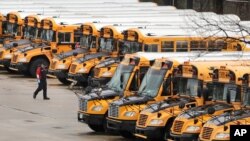The United Nations is calling on governments worldwide to prioritize education, warning the COVID-19 pandemic is putting the future of a whole generation of children on the line.
A global fund created to help children in crisis get an education reports more than a billion young people are out of school as a direct consequence of the pandemic. Education Cannot Wait, which is hosted by the U.N. Children’s Fund, warns many of these children may never be able to go back to school. But, it says, many others can, if given a helping hand.
Executive Director of the Fund, Yasmine Sherif, tells VOA Education Cannot Wait is set up to provide this help.
“It is not how we can do it because we are actually doing it," Sherif said. "It is happening as we speak. We are delivering education and we are doing it from a crisis perspective.”
Sherif explains the Fund was specifically created to function in crises and emergency situations.
“Education Cannot Wait as a Fund, was designed to deal with disasters and onsets of catastrophes, onsets and escalations of conflict and even pandemics too," Sherif said.
The Fund was established at the World Humanitarian Summit in Istanbul in 2016. Since then it has reached 3.5 million children caught in conflict, living as refugees, displaced within their own countries or affected by climate-related disasters. Beneficiaries include young people in the Sahel region of West Africa, in sub-Saharan Africa, in Afghanistan, Bangladesh, and the Middle East.
Sherif says the Fund currently operates in 35 countries. She says the pandemic has forced a radical change in the way its U.N. and non-governmental partners are delivering education. She says they have had to adapt to the realities of social distancing. She says new methods have been devised to compensate for the inability of many students in developing countries to access remote learning during school closures.
“So, we use technology. We use radio," Sherif said. "We use teachers. We use school facilities to address health and sanitation and also school feeding, so that children do not lose their daily meal that is so important for them.”
Before the pandemic, an estimated 75 million children and youth in crises were unable to get an education. Sherif says that number has grown with the advent of COVID-19. She says Education Cannot Wait is urgently appealing for $310 million to reach vulnerable girls and boys most at risk of being left behind.




